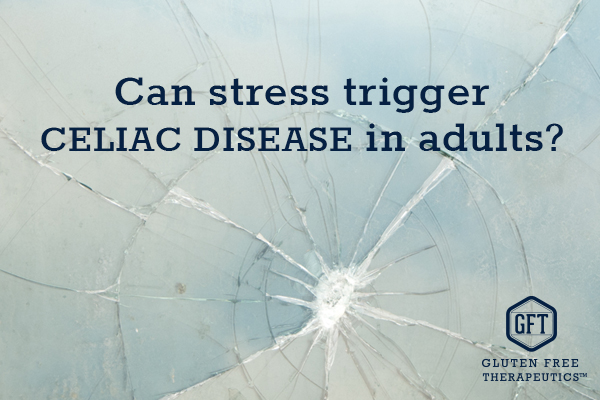
Potential Adult Celiac Triggers
by Alex Reis PhD, GFT science writer
Celiac disease has a strong genetic component, but it’s curious to note that the two versions of genes associated with this condition are also found in about one-third of the general population. Considering that for those people it’s virtually impossible to “escape” gluten and yet only 1% develop celiac disease has raised intriguing questions about what other factors may trigger the onset of this disease.
Many studies have shown that celiac disease has been increasing over the past 50 years. Researchers believe this is not only caused by better diagnostic tools, but an actual increase in the number of people affected by this condition. As human genetics cannot change this quickly – which means the overall number of potential celiac disease patients remains stable – the boost must be due to changes in the triggers that cause the condition. It turns out that, for adults, the list includes not only infections, but also head trauma or even the bread we eat.
Not surprisingly given that celiac disease is an auto-immune condition, any recurrent illness or infections can trigger the development of celiac disease. The list of diseases includes HIV, thyroid disease, cardiomyopathy, diabetes, hepatitis and others. These conditions are likely to elicit a chronic immune stimulation, which in turn may trigger an immune reaction. When it comes to infections, researchers believe these conditions can “help” gluten peptides cross the intestinal barrier, and activate an immune response in susceptible individuals. It’s certainly not uncommon for patients to attribute the onset of their symptoms to a stressful episode or infection.
It doesn’t even have to be a life-threatening infection. For example, researchers have identified that a mild fungal infection with C. albicans can be sensed by the immune system in a similar way to the presence of gluten, which can trigger celiac disease in genetically-predisposed individuals. Other times, like with antibiotics, it’s not the infection per se, but the treatment that acts as a trigger. This seems to be the case with hepatitis, where popular treatments, particularly IFN-α, may set in motion this condition due to their effect on the immune system.
However, not all invading pathogens are actually bad … if present in small doses! Researchers have detected an inverse relationship between H pylori infection and risk of celiac disease. Serious infections can result in permanent gastric problems including ulcers, but it turns out low numbers of this bacteria can have a protective effect against the development of celiac disease. In this case, it’s their absence that represents the trigger for this condition. Again, the mechanism is not known but, if kept under control, this bacteria is associated with lower risks of allergic and inflammatory conditions.
Interestingly, what can be classed as an unexpected trigger for celiac disease involves cases of head trauma. It may be tempting to suggest that this is simply due to the rigorous medical surveillance after any serious accident or injury involving the head. Long term contact with physicians may lead to the detection of other unrelated conditions, including celiac disease.
However, the same effect is not observed with other types of equally dangerous accidents. After any injury, the body reacts against the inflammation by activating an immune response. The problem with this particular response to brain trauma is that it relies on a substance very similar to the one elicited by gluten. In a moment of “temporary confusion”, as the body reacts to one, it may also start reacting to the other and trigger celiac disease.
Finally, many researchers blame changes in our diet during the last half-century to explain the rise in the number of celiac disease patients. The main culprit: bread! This includes many changes in the process of making this food, from genetic selection in the wheat used resulting in varieties with a much higher gluten content to enzymatic modification of wheat prolamins caused by changes during mass production.
What’s important to note is that diagnosis as an adult really is a new onset of disease potentially triggered by one of these factors, and not simply a matter of delayed diagnosis of a childhood condition. The list could go on and there are several other factors currently seen as tentative triggers for celiac disease, including low birth weight, gender or educational level. More research is needed, but this long list only serves to emphasise how multi-factorial this condition is and how describing it as a simple auto-immune condition is a massive understatement.
This original article is made possible by Gluten Free Therapeutics. Our mission is to educate, inform, and provide the most effective nutritional products possible to allow those with celiac disease and serious gluten intolerances to heal their bodies. CeliVites complete line of superior gluten free supplements includes multivitamin/multimineral supplements, iron supplements, and calcium supplements for people living with celiac disease. All CeliVites products are designed to help you heal, restore and rebuild your body, because going gluten free isn’t enough!
REFERENCES
- Akbari P, Braber S, Gremmels H, Koelink PJ, Verheijden KA, Garssen J, Fink-Gremmels J6. Deoxynivalenol: a trigger for intestinal integrity breakdown. FASEB J. 2014;28(6):2414-29.
- Canova C, Zabeo V, Pitter G, Romor P, Baldovin T, Zanotti R, Simonato L. Association of maternal education, early infections, and antibiotic use with celiac disease: a population-based birth cohort study in northeastern Italy. Am J Epidemiol. 2014;180(1):76-85.
- Ludvigsson JF, Hadjivassiliou M. Can head trauma trigger celiac disease? Nation-wide case-control study. BMC Neurol. 2013;13:105.
- Riddle MS, Murray JA, Cash BD, Pimentel M, Porter CK. Pathogen-specific risk of celiac disease following bacterial causes of foodborne illness: a retrospective cohort study. Dig Dis Sci. 2013;58(11):3242-5.
- Riddle MS, Murray JA, Porter K. The incidence and risk of celiac disease in a healthy US adult population. Am J Gastroenterology. 2012; 107(8):1248-1255.
- Rubio-Tapia A, Kyle RA, Kaplan EL, et al. Increased prevalence and mortality in undiagnosed celiac disease. Gastroenterology. 2009;137(1):88–93 Stene LC, Honeyman MC, Hoffenberg EJ, et al. Rotavirus infection frequency and risk of celiac disease autoimmunity in early childhood: a longitudinal study. Am J Gastroenterol. 2006; 101:2333–224
Comments ()
















I really appreciate this article . I’ve not been diagnosed but can eat no gluten at all. I had misinformation before my biopsy. My test came back negative. I have had thyroid cancer after undiagnosed hashshimoto’s disease. I also had colon cancer kidney stones and hair loss inability to regulate body temp. All symptoms of Celiac but no one will diagnose it. I won’t go back to eating gluten because I have such a bad reaction to gluten. Why is it that?
Kathy can you email me and let me know what the symptoms are you experience when ya eat gluten, I have all of a sudden had lots of medical a problems to happen and I noticed I was worse if I ate it. Does your throat, mouth or neck swell or get head and neck pain if ya eat it. That’s just one thing that happens to me.
My grandson was diagnosed with celiac disease about 16 yrs ago. His doctors couldn’t figure out the cause of his problems until I took him to Riley Hospital at U of Indiana. They knew right away… and did biopsy which proved it. He also has Hashimoto and several other serious health issues. If ppl would smarten up and understand that our food today is modified, reengineered and loaded with useless garbage…they would feel a lot better by eating GF and unprocessed foods… Corn and soy are also reengineered foods to avoid.
My celiac was “triggered”, I believe, by a triple attack on my body. By that I mean I had 3 major stressors in my life at once. My grandmother passed away after a long battle with Alzheimer’s Disease. At the same time, I was dealing with a very stressful, unhappy relationship. And then a “24 hour” stomach virus that was going around hit me and ended up being a week-long virus and hospitalization. I was so sick, described as looking “grey”, severely anemic and had to have a tranfusion. It was awful. It took only 4 days for my diagnosis. I would have never thought celiac disease and I’m a nurse. I didn’t have a clue that I carried the gene, nor heard much about it before then. This was a little over 9 years ago. Only 2 days without gluten and I was already feeling better. Unfortunately, my son has the gene also… 🙁
As a child,I was told I had a “nervous stomach.”My Celiac disease was 1st diagnosed After my 2nd child was born @35years old.I had a C-section then and cholecystectomy 5weeks after with pancreatitis 4weeks after that.I do not drink or smoke,and I was a working musician/med tech.In 1994,after 20 years of marriage,I had a stressfull divorce,and became a single parent w/o much help. I worked 40+hours,and was diagnosed with Diabetes.I still work 40+hours,am gluten free.My 2 siblings and 1niece are also celics
Ok, I’ve gone thru the blood tests and skin biopsy done by a dermatologist. What a waste! The doc hardly took the time to listen to me. I was suffering greatly! I have the terrible rash everywhere, 2 1/2 years later still! I told him I had been GF for 6 months at the time of my tests. I waited 3 months to see him! He told me it was in my head. Stop picking and scratching. Deal with my anxiety!
I just cried. That is all wrong. I cannot eat any gluten. The rash keeps breaking out. It’s in my scalp. It itches! My oldest daughter has a diagnoses of Celiac. She is extremely sensitive. I’ve had this rash in smaller doses for over 15 years. Once I went GF and cleaned it out of my system I suffer if I have any gluten. I also now have diabetes type 2 and thyroid dis ease. Help!!
Elizabeth, it is concerning to hear of the difficulties you have had with your diagnosis and treatment. We have written articles about two of your conditions that you may find helpful. To understand the connection between celiac disease and Hashimoto’s thyroiditis (thyroid disease) follow the link https://www.glutenfreetherapeutics.com/living-gluten-free/medicine-research/hashimotos-thyroiditis-celiac/.
To learn more about your rash follow the link to dermatitis herpetiformis. https://www.glutenfreetherapeutics.com/living-gluten-free/medicine-research/celiac-disease-affects-skin/
Anxiety can also be a symptom of untreated CD. We have a couple of articles about the connection between CD and mood as well. You can search for them on the blog page if interested.
Hopefully you will find this information helpful.
Thank you for your comment.
Elizabeth, I’ve been reading a lot about leaky gut lately (online and there are several books, also). It’s directly related to celiac, from what I’ve read (cause and effect relationship). And autoimmune disease . . . Gut bacteria imbalance – and inflammation – appear to be the root cause of things like thyroid and blood sugar issues. (I’m gluten, casein, and lactose intolerant and have hypothyroidism and asthma/allergies – just starting to find out about the gut connection.)
It took 2 years of the gluten free diet for my rash to go away, so I had it for 4 years, and it comes back if I accidentally eat gluten. Use non iodized salt and vitamins without iodine until it’s gone. I have Thyroid disease also, but it’s usually easily manageable with medication. My former dermatologist was ridiculous, too. New one prescribed Clobetasol topical cream for the lesions. To my surprise , it worked. Breathe. It will get better.
I asked my doc how could this be that I have Celiac. I had eaten these foods all my life and have not had bad reactions.Then all of a sudden WHAM. He asked a lot of questions about what I had been going thru,I explained 8 months prior my Mom had been diagnosed with pancreatic cancer and died 3 months later, leaving me to care for my elderly Dad. STRESS OVERLOAD…..TRIGGER!
I was diagnosed in 2010. Even if I am perfect on my diet, stress or nerves worrying about bills whatever it will trigger an attack. They have me on Welchol to control the diahrea but it isn’t working as well since I had a bout with the flu or something. Is there anything besides Immodium I can add to my regimine ? I have had a severe head injury which I fight every day. Due to a billing misunderstanding I have been on my own for at least 4 years. Any help would be appreciated. Thank you
I was diagnosed with celiac disease ten years ago. I have been gluten free that long. When I got another blood test it showed I was negative is that because I have been gluten free for ten years? Prior to being diagnosed I had so much stress in my life it was unbelievable. I also have the gene for celiac disease.
can not test if you dont have Gluten in your system
Absolutely!!! my was in a Roll over accident where i suffered a base skull fracture, never recovered, so 1 useless exploratory surgery, and $22,000 in medical bills 3 yrs later, DX’d in 2011 now my daughter has the gene in her fathers side so quickly attacked the Tests her after my delima and now We Are Both GF …Now my Mother=in=law was in a roll over and she is Experiencing simalar issues.
It isn’t the gluten, it’s the glyphosates and other pesticide residues in our food that is causing health issues.
I am 51 and was diagnosed with Celiac’s both through blood and scope. I was shocked as well as been eating and drinking gluten my whole life. Could have been stress that triggered or hashimoto’s hypothyroidism as I have both so not sure if one triggered the other. My 12 year old son was just diagnosed with Celiec through blood test. So was wandering if it is worth getting him scoped to confirm? He measured a 24 of something which dr said was pretty high.
Hello Greg, Thank you for your comment. Your question regarding your son’s testing is really one for his doctor. There are a couple of ways of looking at it. One is that if you have celiac disease and two connected autoimmune diseases it is highly probable that your son does have celiac disease and should go on a gluten free diet. The earlier the disease is caught the less opportunity for one of the many connected autoimmune conditions to occur. It is good to know definitively if he has celiac. He is still growing and treating the disease now could really help him. But the scoping is up to you and his doctor. We always tell people that celiac disease is a serious disease that can affect every system of the body. A strict gluten free diet and proper vigilance against cross contamination and gluten exposure is the best and only medicine celiacs have. Good luck with your diet and our son. We wish you good health.